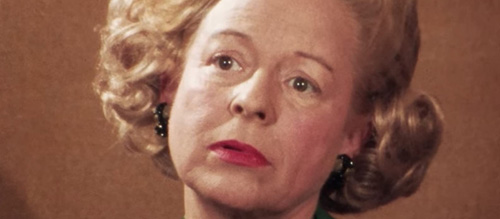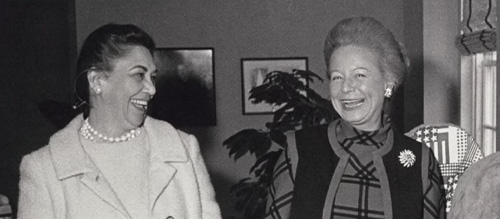The Martha Mitchell Effect (2022) Short Film Review

The Martha Mitchell Effect (2022)
Directors: Diane Alvergue, Debra McClutchy
Have you ever heard of the Martha Mitchell Effect? You probably should have. It’s the term used when a person’s reality is professionally labelled as delusional and later revealed to be true. Martha Mitchell was the wife of John N. Mitchell, the United States Attorney General during the republican terms of Richard Nixon. John N. Mitchell served between 1969 and 1972, and sandwiched his tenure with the role of Nixon campaign manager for each of his presidential terms. He was arrested and imprisoned for his involvement in the Watergate scandal that forced Nixon into resignation and labelled the president a disgrace. Martha Mitchell was telling the press of the party’s wrongdoings before it ever got out. They – the republican party of the time, including her husband and the president of the United States – imprisoned Martha Mitchell, drugged her, and committed to a smear campaign aimed at silencing her. She was proven right. The republican party under Richard Nixon was corrupt. Martha Mitchell is, to this day, arguably the most well-known person to have been proven to have suffered gaslighting by her own nation’s government.
It’s a story that is more than fifty years old, but it feels painfully relevant to the corruption of our times and the dirty tricks played in big-league politics to this day. You can probably think of people who’ve been labelled as insane, over-zealous, or completely unreliable, seemingly out of nowhere after years of being indulged and even promoted. Martha Mitchell was this exact person. She was a lobbyist for the republican party, entrusted with earning the votes of women and for getting the right press onto Nixon’s side. She was a little eccentric, sure, but charismatic and self-assured in a way that translated to the housewives of the era and made her a fascinating celebrity for her time.
What she suffered was horrifying and tragic, but directors Diane Alvergue and Debra McClutchy don’t commit to the gruesome realities that she suffered personally. Instead, they do what all good documentarians must: they contextualise her horrors in the time, the politics, and the gendered oppression that made such abuse possible, and teach us a lesson on one of the contemporary era’s most public victims of a now well-known issue, gaslighting.
The Martha Mitchell Effect seems to be the result of hours and hours of work from teams of people. There are the big, typical documentary selections such as television interviews, behind-the-scenes footage from campaign videographers, and the like. But there is also footage of house parties, moments in the oval office, paparazzi-style recordings of Martha on the streets or just leaving her apartment block. Much of the film is told through this footage, the rest told through the voiceovers of well-known and heavily involved individuals. The way these more recently recorded voiceovers are introduced is nothing short of astonishing, particular party campaigners and members of the press found among the masses of people in the archival footage and presented to us as proof of each person’s credentials. It must have been a monumental task to find them.

As with any political documentary, criticism of the agenda of the filmmakers themselves can be levelled. In the case of The Martha Mitchell Effect, such criticism can be tied to how the film overlooks some of Mitchell’s more problematic political stances, glancing an eye at them to prove her association to the republican party of the time, but forgetting about their negative impact and spreading of hatred in favour of painting a more positive picture of this former public figure, that (in the opinions of the filmmakers) being a hero for our times.
At 40 minutes, it’s not like The Martha Mitchell Effect gets distracted in its efforts to reach the goal of re-evaluating one of the most influential women in mainstream American politics of the era. It does so with great effect, establishing her trauma and suffering as a vehicle through which to better evaluate gendered oppression, and presenting her track from party campaigner to part-party whistleblower as one of the great American stories of being faithful not to parties and people but to the nation itself. Martha Mitchell is, in The Martha Mitchell Effect, the ultimate American patriot.
Films like this will always be fascinating. Their focus on the elements of stories not often considered important enough for filmmakers from eras past make them invaluable additions to our society’s re-evaluation of itself, of our understanding of the machinations of our world. The Martha Mitchell Effect is not all-encompassing, but it reaches its goal and establishes its intentions with aplomb.
Score: 15/24
You can watch The Martha Mitchell Effect on Netflix. More coverage of the Oscar-nominated short films can be found on our Short Film page.

